Graham Reid | | 9 min read
Blur: There's No Other Way
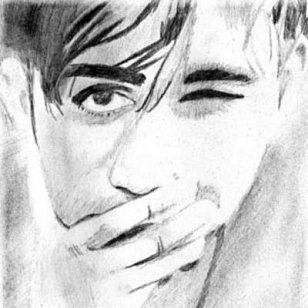
Somehow it seemed inevitable that an English musician would talk about clothes. These people work in a world where a photo shoot can be as important as the album of the moment. And right now with the 70s revival, bell-bottoms, chokers and an Afro are being analysed as “cultural signifiers.” Every music has its own pair of trousers.
So hello Damon Albarn of Blur, gorra new outfit?
“These Fred Perry shirts are associated with Mods,” he says, fingering a cheap-looking short-sleeved shirt, “and these boots [Doc Martens] are associated with skinheads. I’m wearing red laces, too. If you wear white laces, you’re a fascist skinhead. Red is just a skinhead – but obviously I’m not a skinhead.
“So these are all signals and I wanted to make strong impression. I have no ambiguous sexuality to exploit, nor any demons inside me. I’m quite a happy person. And doing this is a reaction to the scene that’s happening now.
“But I think I am articulate enough to carry it off.”
And he is.
As an admittedly middle-class child of British commuterland, Albarn articulates his impressions of the world in a laconic Home Counties drawl which is casual, informed and assured.
His clothes have their references in the mod culture of the Who and the Jam (’65 and ‘77 respectively) and after two tours of the States he came back home wanting to write “an Essex Under Milk Wood” that paraded it’s very Englishness in its music and lyrics with matching shirt and boots.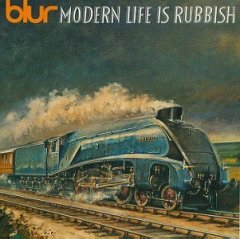
With their second album, Modern Life is Rubbish, Blur have done that just as English pop culture is reclaiming itself from the siege of checked-shirt grunge merchants from Seattle and indie rock from Boston.
Manchester might have stumbled and another Swinging London scene just a bit hard to imagine in the aftermath of Margaret Thatcher, but England swings again. To a very English beat.
Here’s Peter Wiggs of Saint Etienne telling Select magazine what’s so great about Britain and British Pop.
“Pie and mash, pubs, fashion, TV, school uniform, accents, countryside, milkmen, beer, chips, party. GB pop = Billy Fury, Dusty Springfield, the Beatles, Stones Who, Pistols, Clash, Mott the Hoople, Lieutenant Pigeon, Dexys, Adam and the Ants, the Smiths, Stone Roses, Bizarre Inc.”
And here’s a pale-faced Jarvis Cocker of Sheffield band Pulp on the same subject.
“When British pop is great, it’s great because of the personality behind the music. The sense of the romantic in the everyday. Ray Davies finding the poetic in watching the sun go down behind Waterloo Station.
“You don’t get that in much American rock.”
Albarn, too, frequently cites Ray Davies as “very near my idea of perfection in songwriting who carried it off with an immense amount of dignity.”
What this highlights is the huge distance between American and British pop cultures at this pointing the early Nineties.
Stateside, the indie generation from the Sub Pop and SST labels (Soundgarden, Bob Mould, Dinosaur Jr, Sonic Youth) has gone corporate and reached the middle of the market. Pearl Jam have sold twice as many copies as the latest Madonna album.
American also has great new bands such as Sky Cries Mary – a neo-psychedelic eight-piece out of, believe it or not, Seattle – who do a trippy version of the Stones’ old 2000 Light Years from Home on their debut album, A Return to the Inner Experience. It’s an album of samples, spiralling Jefferson Airplane/Doors references, a drum solo undercut with disturbing voices and effects, dance beats and magic mushrooms on the cover.
Then there’s Dada, a young trio from California who lift a whole Jefferson Airplane drum pattern for a song which invites you up to their room “to look at my posters.”
In America right now, a lot of young bands are singing, rather suspiciously, about flying and, like, colours and like, you know, like really amazing, far out, wow.
But if young Americans are out of it, the English are into it. Moody, introverted stuff from Suede who walk the anxious, sexually ambiguous line, sing about sleeping pills and The Drowners, are very fey, and open their album with the line, half-asserted, half-pleading, “because we’re young.”
And that’s the why/why not of Suede.
Or there are the Auteurs, billed in some circles – wrongly – as the Bolan to Suede’s early-70s Bowie. T. Rex they aren’t, but they sing about being Starstruck (“my act effete and failing”) and are, in the words of Allan Jones in Melody Maker, “icily detached.”
It’s very anxious. And very English.
It’s also selling records back in Blighty. Sales were up 14.4 per cent in the first quarter of this year.
Whether they are hyped or heroes doesn’t enter into it. Suede, The Auteurs and all the rest are good for business.
In the middle of this Englishness sits Damon Albarn from Blur, a band whose debut album, Leisure, in 1991, went to number two in Britain and arrived in the middle of the Manchester wave. But, unlike Northside, Stone Roses and others, Blur have survived the hype to appear with a second album.
That puts them a few paces ahead of that crop . . . and just a little cocky.
“None of them could write songs,” says Albarn with a smile.
Blur could write a good song. Well, one good song which wasn’t theirs in the first place. Their “almost hit in America” was There’s No Other Way, which owed a huge debt to Syd Barrett’s mid-60s work with Pink Floyd, notably See Emily Play.
Albarn accepts the suggestion/accusation without equivocation. They used to play the two songs back to back on radio, he says, laughing. But it also helped them to survive.
“Because of that almost-hit, we sold more records in America than anyone other than Jesus Jones and EMF at the time. That gives the record company confidence, and we also did a lot of touring. We were professional and were almost reborn when we came back from our second American tour when we found we had no option but to look at ourselves and ask why we wanted to keep doing it.
“We didn’t have the motivation of, ‘Lets see the world and get on Top of the Pops’ because we’d done all that. We became obsessed with this fantasy England we had created while we were in America – a nostalgic, comforting green island where everyone was all right.
“It was a place that didn’t have the vacuousness that America was filling us with.”
What Albarn rediscovered during three American tours was what it meant to be English, that feeling of separateness. Two countries divided by a common language.
And so, coincidentally in line with the newfound Anglo pride perpetrated by the rock press, Blur address their Englishness on Modern Life is Rubbish.
“I have a romantic vision of England and it became a discipline to make sure that everything I wrote for the album was on the same theme. The album title means that modern life lives with the rubbish of the past . . . and the greatness, of course.
“I know we’re going to have problems with Americans on this album because it has no reference points for them. But every 10 years or so Britain goes back to its roots and the Americans don’t get it. Then five years later they do. These days they get Ray Davies and the Kinks, the Sex Pistols and the Smiths, so what we are doing is more an investment for the future.”
His references to Ray Davies of the Kinks are interesting. At the height of the British invasion of the 60s, it was Davies, somewhere off to the side, offering the commentary on Englishness: Waterloo Sunset, Sunny Afternoon and Autumn Almanac. Davies’ satire (on Dedicated Follower of Fashion) turned to evocations of that English life of tea, chips, tube stations and rainy days.
But Davies’ reflections also looked back to music halls and the end-of-the-pier traditions of English music. Blur have grown up in the aftermath of punk, so their music is more grounded in a kind of Buzzcocks/Pistols sound or, as with Suede and the Auteurs, locates itself specifically within 70s Britpop.
Sunday Sunday is a toughened-up Penny Lane (“walk in the park, meet and old soldier and talk of the past” with Beatlesque trumpets) and Advert suggests people “need a holiday somewhere in the sun.” A direct reference of the Sex Pistols’ Holidays in the Sun?
“Oh yes, and that’s the most punk-sounding song on the album too. The first track [For Tomorrow] is the Bowie track . . . that’s the rubbish of the past here and being brought back again. Some people might say I can just imitate, but that’s not it at all. It’s a very English tradition, that tripping the light fantastic through London. It’s not retro like some of these other people around at the moment.
“The newer bands haven’t grasped what it is to be nostalgic yet, because they haven’t been out of England.”
When Albarn observes the advantages of leaving Britain to discover yourself, he is touching on a valid point. It took America to tell the Beatles they were different, spoke funny, had a unique sound, and that by smoking and drinking in public they were doing something most unseemly for pop entertainers.
Albarn is smart, and well travelled enough to recognise that. He’s also well educated and most unrockist. Very English, in fact.
“I come from Essex, from an area which was not quite city and not quite country. I had all the advantages of the educated, white, middle-class person with a slightly more left-of-centre than conservative background.
“I had a good musical education and love Kurt Weill, Gershwin, Noel Coward and those people. I was lucky at school because I had a good teacher and my parents were involved in music and theatre.
“I didn’t go to a public school [private school in England] because my parents didn’t think that sort of privilege was right.
“I feel qualified to write about the things I do. I can’t be anything but an observer of life. I can’t write about the depths of misery because I’ve never felt it. In some ways, I’m perhaps disadvantaged in that. Unless something profoundly dark happens to me, I’m never going to reach inside myself, so I have to sing about kitchen sinks.
‘What annoys me about newer bands is they don’t know where this particular Englishness in music comes from.”
But it is only distance which has lent enchantment to that view. Looking around him, Albarn would see an England blasted by Thatcherism where young, homeless unemployed sit all day in tube stations begging or pennies. That’s not his England, although the aggressive edge of his music fits the mood of the moment.
While Suede swoon with doomed romanticism and the Auteurs advance a pale, wan intensity almost free of attachment, Blur make diverse pop noises that roll through a couple of generations of Anglo-pop.
Blur’s Colin Zeal is an update on the Kinks’ Well Respected Man, and if “hanging on quiet desperation is the English way,” as Pink Floyd once said, then “the emphasis is on coping,” sing Blur.
Blue Jeans talks of “Portobello Rd on Saturday” and in Starshaped Albarn writes, “washing with soap/behind the collar/keeps a clean mental state/don’t usually bother/in cold weather...”
It isn’t pretty, it isn’t elevating . . . but it is in that English tradition.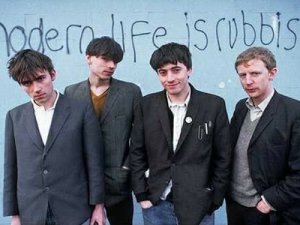
If English pop doesn’t travel well into America, the same might be true the other way. The Auteurs took a poke at British bands adopting the grunge attitude on their New Wave album with American Guitars, and there is consumer resistance in Britain to many American college radio bands that New Zealanders take for granted.
While England blinks and rubs its eyes in bewilderment at the trippy incense-and-hookah-sound of Sky Cries Mary and Americans laugh in the face of dour English bands and their dank-flat melodramas, out here on the periphery we have observer status on both.
And Damon Albarn of Blur could be a reliable observer of a romanticism that transcends the grim realities of life under grey British skies.

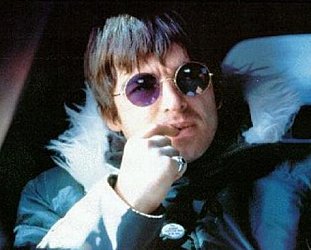
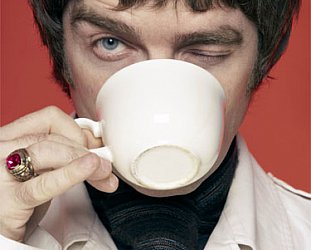
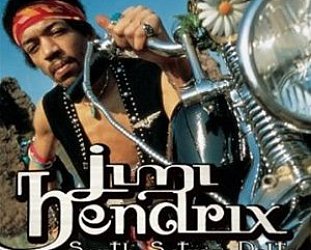
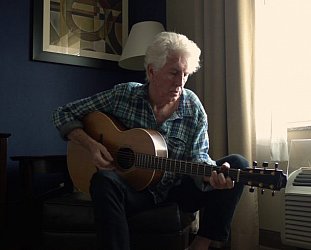

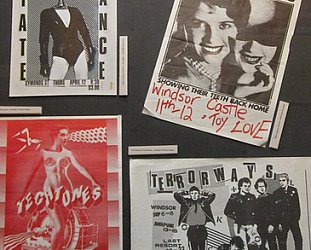
post a comment